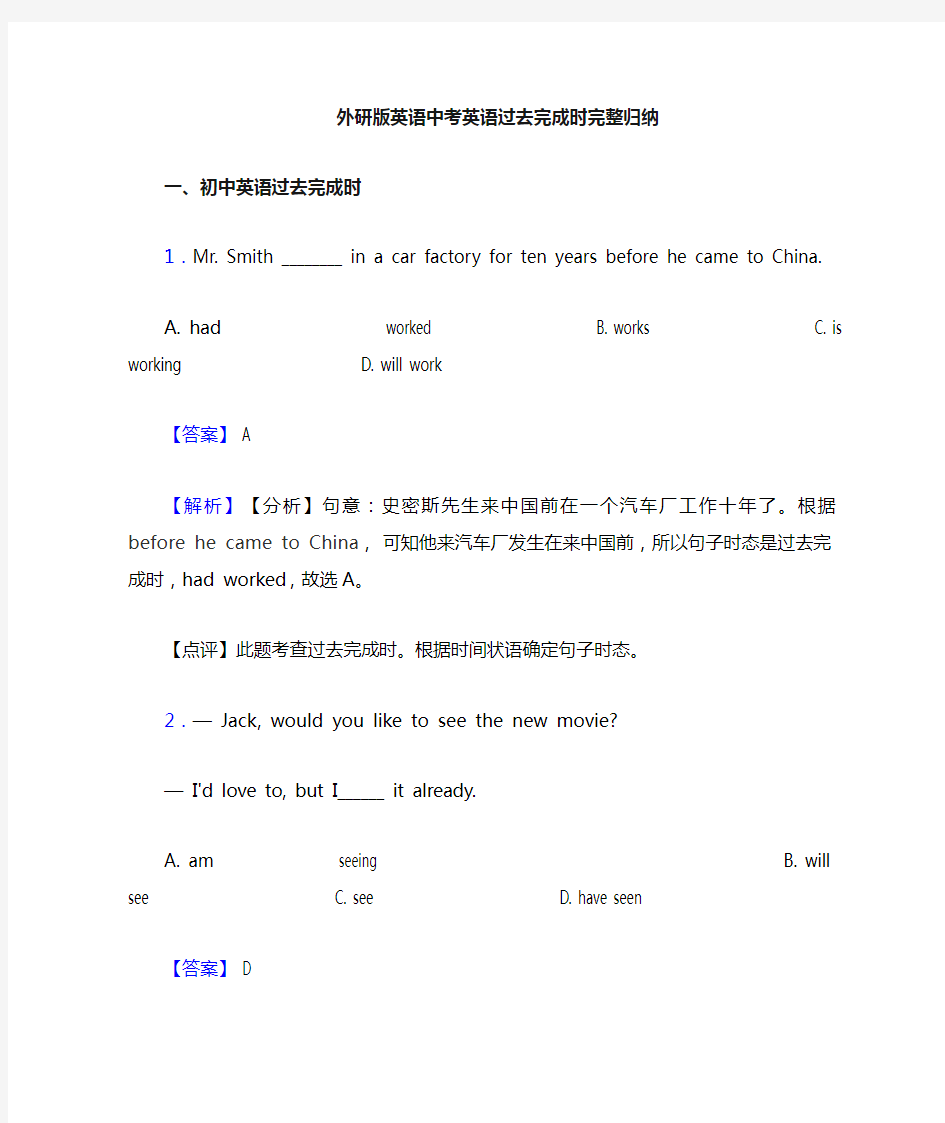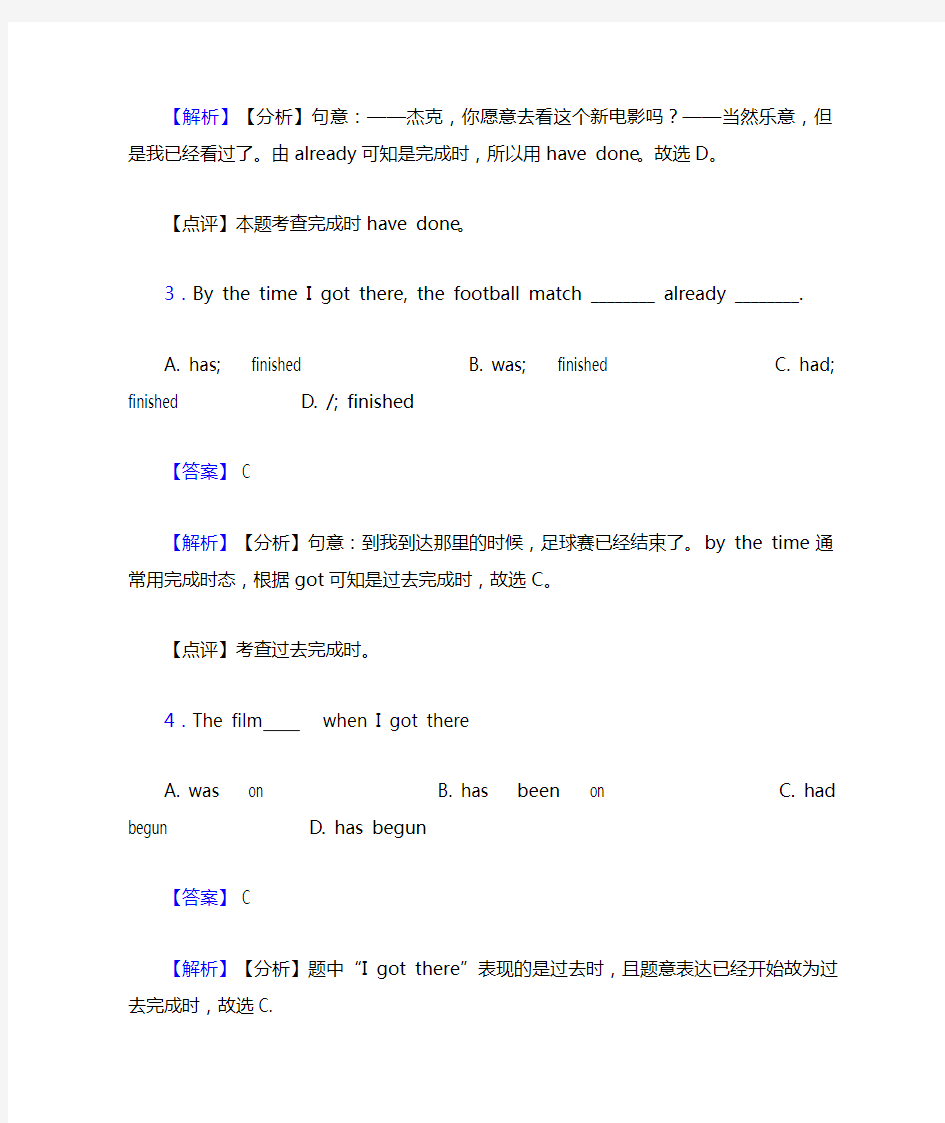中考英语过去完成时完整归纳


外研版英语中考英语过去完成时完整归纳
一、初中英语过去完成时
1.Mr. Smith ________ in a car factory for ten years before he came to China.
A. had worked
B. works
C. is working
D. will work
【答案】 A
【解析】【分析】句意:史密斯先生来中国前在一个汽车厂工作十年了。根据before he came to China,可知他来汽车厂发生在来中国前,所以句子时态是过去完成时,had worked,故选A。
【点评】此题考查过去完成时。根据时间状语确定句子时态。
2.— Jack, would you like to see the new movie?
— I'd love to, but I______ it already.
A. am seeing
B. will see
C. see
D. have seen
【答案】 D
【解析】【分析】句意:——杰克,你愿意去看这个新电影吗?——当然乐意,但是我已经看过了。由already可知是完成时,所以用have done。故选D。
【点评】本题考查完成时have done。
3.By the time I got there, the football match ________ already ________.
A. has; finished
B. was; finished
C. had; finished
D. /; finished
【答案】 C
【解析】【分析】句意:到我到达那里的时候,足球赛已经结束了。by the time通常用完成时态,根据got可知是过去完成时,故选C。
【点评】考查过去完成时。
4.The film when I got there.
A. was on
B. has been on
C. had begun
D. has begun
【答案】 C
【解析】【分析】题中“I got there”表现的是过去时,且题意表达已经开始故为过去完成时,故选C.
【点评】此题考查过去完成时。
5.—I ______ know you can play the piano so well.
—Thank you.
A. didn't
B. don't
C. can't
【答案】 A
【解析】【分析】句意:——我不知道你钢琴弹得那么好。——谢谢。A. didn't不,一般过
去时态,指过去的状态及过去发生的动作;B. don't不,一般现在时态,指经常性、习惯性
的动作;C. can't不能,指能力;不可能,表示否定的推测。根据语境,说话时我已知道你
钢琴弹得好,不知道是过去的状态,用一般过去时,故选A。
6.—What's up?—I missed the train. By the time I got to the train station, the train
for 10 minutes.
A. had left
B. has left
C. has been away
D. had been away
【答案】 D
【解析】【分析】句意:一怎么啦?一我错过了火车。在我到达火车站前,火车已经离开了
十分钟了。A.had left过去完成时态;B.has left 现在完成时态;C.has been away现在完成
时;D.had been away过去完成时。by the time,在......之前,是过去完成时的标志词,表示
过去的过去的时间。和一段时间连用,动作应该是延续性的,leave对应的延续性状态是be away,故选D。
7.By the time of last year, she the piano for five years.
A. learnt
B. has learnt
C. had learnt
D. will learn
【答案】C
【解析】【分析】句意:到去年的时候,她已经学了五年钢琴了。由时间状语By the time
of last year可知这里是指在这个时间之前已经完成的动作,应该用过去完成时:had+动词
的过去分词。故答案为C。
【点评】考查过去完成时。掌握过去完成时的构成和用法。
8.By the time he ______________ at the cinema, the movie ______________ for five minutes.
A. arrived; had begun
B. had arrived; had begun
C. arrived; had been on
D. had arrived; had been on
【答案】 C
【解析】【分析】句意:当他到达电影院时,电影已经开演五分钟了。arrived到达,一般
过去时;had begun开始,过去完成时,had been on进行,上映;begin开始,是短暂性动
词,不能和段时间连用,根据for five minutes.故排除AB,be on进行,上映,表状态,可
和段时间连用,by the time到……时候,从句用一般过去时,表示“截止到从句动作发生时,主句动作已经完成,即过去的过去”,主句用过去完成时,故选C。
【点评】考查动词时态。注意句子涉及到begin和be on的词义和用法。
9.By the first day of August, 2007, the PLA ________ for eighty years.
A. founded
B. has founded
C. has been found
D. had been founded
【答案】 D
【解析】【分析】句意:到2007年8月1日为止,中国人民解放军已经成立了80年了。句中有by+过去的时间,表示到…为止,句子用过去完成时,found成立,故选D
【点评】动词的时态是学习英语过程中非常重要的知识。现在完成时表示动词在过去发生对现在造成的影响。现在完成时往往和already,yet,for+一段时间,since+点时间的时间状语连用。过去完成时表示动作发生在过去的过去,句子中强调过去的动作对现在造成的影响。
10.My parents ______________ to work by the time I ______________ up.
A. began; get
B. began; had got
C. had begun; had got
D. had begun; got
【答案】 D
【解析】【分析】句意:我起床的时候,我的父母已经开始工作了。began开始,一般过去时;had begun开始,过去完成时;get up 起床,一般现在时;had got up起床,过去完成时。by the time到……时候,从句用一般过去时,表示“截止到从句动作发生时,主句动作已经完成,即过去的过去”,主句用过去完成时,故选D。
【点评】考查动词的时态。注意by the time的词义和用法。
11.I asked your mother if she that dress.
A. bought
B. had bought
C. had buyed
D. buy
【答案】 B
【解析】【分析】句意:我问你妈妈她是否买了那件裙子。本句中从句的动作应该是发生在ask之前的. 所以用“had+过去分词”形式来表达。故选D
【点评】考查过去完成时。
12.By the end of last month, we ______already ______ our lessons.
A. has, finished
B. have, finished
C. had, finished
D. will, finish
【答案】 C
【解析】【分析】题意:到上个月末为止,我们已经结束了课程。根据句意,应选C。【点评】注意时间状语,很容易选出。
13.—Are you surprised at the ending of the movie?
—No, because I ___________ the story.
A. read
B. will read
C. have read
D. was reading
【答案】 C
【解析】【分析】句意:—你对这部电影的结局感到惊讶吗?—不惊讶,因为我读过这个故事。根据语境判断,这本书已经读过,应该用现在完成时态来表示,故答案为C。
【点评】考查现在完成时态。主语为第一人称故动词应使用原形。
14.By the time my mum got home, I _______ my homework.
A. have finished
B. had finished
C. finished
D. will finish
【答案】 B
【解析】【分析】考查动词时态。句意为“我母亲到家时,我已经做完作业了。”主句动作在从句动作(一般过去时)之前就已经完成了,因此主句应用过去完成时,故选B。
15.– What were you doing when I called you last night?
– I ______ my homework and was going to bed.
A. did
B. had done
C. was doing
【答案】 B
【解析】【分析】had+动词过去分词构成过去完成时,表示的是过去的过去,答语中go to bed是过去将来时,do my homework发生在go to bed之前,即过去的过去,要用过去完成时had done my homework.句意:昨天我给你打电话的时候,你正在做什么?我完成作业正要去睡觉。故选B。
【点评】考查过去完成时的用法。
16.We to be able to come and see you.
A. had hoped
B. hope
C. have hoped
D. are hope
【答案】A
【解析】【分析】句意:我们本来希望能来看看你。动词hope用过去完成时来表示过去未曾实现的想法,希望,打算或意图等。故选A。
【点评】考查过去完成时。
17.Johnson ______ two tickets for the concert before Joe made a phone call to him.
A. had booked
B. booked
C. has booked
D. were booking
【答案】 A
【解析】【分析】句意:乔打电话给杰克逊前,杰克逊已经定了两张音乐会的票。表示“过去的过去”动作要用过去完成时(had + 过去分词),所以选A。
18.– Were you late for work yesterday morning?
– Yes. By the time I got to the bus stop, the early bus .
A. has already left
B. is already left
C. had already left
【答案】 C
【解析】【分析】句意:昨天上午你上班迟到了吗?——是的,等我到达公交车站的时候,早班车已经开走了。结合语境可知下文描述的是过去某时前已经完成的动作,故用过去完成时态。选C。
【点评】英语中的时态主要是借助于时间状语与上下文语境来进行判断。解答此类题型,首先要注意句子中的时间状语,如果没有则要通过分析上下文,结合语境来判断句子的时态。英语疑问句中一般具有时态上的对应关系,注意结合这一特点进行区分。
19.— your father a newspaper when you got home?
— No, .
A. Was; reading; he was
B. Did; read; he did
C. Was; reading; he wasn't
D. Did; read; he didn't
【答案】C
【解析】【分析】句意:—当你到家的时候,你爸爸正在读报纸吗?—不,没有。此题考查在过去的某个时间发生的事情,用过去进行时,其结构为was/were doing,其疑问式为提前be动词,否定式回答为:No,主语+be动词后加not。根据句意,故选C。
【点评】考查一般疑问句的构成和回答,过去进行时态,根据时间状语选择合适的时态。
20.By the time we got there, the film ________ already.
A. began
B. has begun
C. have begun
D. had begun
【答案】 D
【解析】【分析】句意:我们到那儿时,电影已经开始了。by the time,直到……时候,指从过去某一点到从句所示的时间为止的一段时间,常与过去完成时连用。故选D。
【点评】考查时态,注意 by the time+过去时的用法。
二、初中英语动词的时态
21.The boy ______ for her in the rain for nearly half an hour before she appeared.
A.waits B.waited C.has waited D.had waited
【答案】D
【解析】句意:在她出现前,那个男孩已经在雨中等了接近半个小时了。因为before后用的是一般过去时,wait这个动作发生在appeared之前,也就是过去的过去,所以空格处应该用过去完成时。故选D。
22.—Laura, how soon will you get back from abroad?
—Hmm, ________. See you then.
A.ten days ago B.twice a month C.for an hour D.in ten months
【答案】D
【解析】句意:——Laura,你将多久从国外回来?——嗯,十个月后。到时候见。ten days ago十天前,用于一般过去时,twice a month一个月两次,用于一般现在时;for an hour 长达一小时,用于现在完成时。in ten months十个月后,用于一般将来时。根据how soon will you get back from abroad?可知此处是一般将来时,表示将要用多长时间,故用in ten months,故选D。
23.I’ll ring you up as soon as he .
A.arrive B.arrives C.will arrive D.arrived
【答案】B
【解析】句意:他一到我就给你打电话。在as soon as引导的时间状语从句中,当主句是将来时的时候,从句用一般现在时表示将来。he为单数,所以谓语用第三人称单数。故选B。
24.—Do you know when we ________ our first simulate (模拟) exam?
—Sorry, I have no idea. But when I ________ the news, I will let you know.
A.will have, get B.have, will get C.will have, am getting
【答案】A
【解析】
【详解】
句意“-你知道我们什么时候会有第一次模拟考试吗?-对不起,我不知道,但是当我知道消息,我会让你知道”。第一空处,表示“将有第一次模拟考试”,用一般将来时,排除B;第二空处根据主将从现原则,when引导的从句用一般现在时,故选A。
25.Peter and Linda Beijing for Shanghai yesterday afternoon.
A.leave B.left C.are leaving D.will leave
【答案】B
【解析】
【详解】
句意:昨天下午Peter和 Linda离开北京去上海了。短语leave +某地+for+某地“离开某地去某地”根据yesterday afternoon可知,句子应该用一般过去时,故选B。
26.—Why are you walking so quickly, Edward?
—There_____ a talent show in ten minutes.
A.will have B.will be
C.is going to have D.are going to be
【答案】B
【解析】
【分析】
考点:考查一般将来时。
【详解】
试题分析:句意:——你为什么走那么快,爱德华?——十分钟后就有个才艺表演。根据时间状语in then minutes十分钟后,句子要用一般将来时;句型there be有……;其一般将来时结构为there will be或there is/are going to be,根据主语a talent show单数,所以用is,故C和D不对,故选B。
27.— Why did so many people get hurt in the earthquake?
—Don’t you know? People when it happened that night.
A.slept B.have slept C.sleep D.were sleeping
【答案】D
【解析】句意:-为什么这么多人在地震中受伤? -你不知道吗?当晚发生的时候,人们都在睡觉。
由句子when it happened that night.可知是过去时,因此主句用过去时。排除B/C。再根据语境可知,地震发生的时候,人们正在睡觉。用过去进行时。故选D。
28.I _________a book three days ago and I __________it yet.
A.bought; didn’t read B.bought; haven’t read
C.have bought; didn’t re ad D.have bought; haven’t read
【答案】B
【解析】
句意:我三天前买了一本书,我还没读过。根据时间three days ago(三天前)可知此句时态是一般过去式,故填bought,根据yet(用于否定句或疑问句)可知此句时态是现在完成时,可知填haven’t read。故选B。
29.Andy doesn’t want to see the film Coco because he it twice.
A.sees B.is seeing C.will see D.has seen
【答案】D
【解析】
【详解】
句意:Andy不想看《寻梦环游记》这部电影,因为他已经看过两次了。sees看见,一般现在时态;is seeing现在进行时态;will see一般将来时态;has seen现在完成时态。根据句意可知,Andy已经看过两次了,这里表示过去的动作对现在的影响,应用现在完成时态,故选D。
30.We a few museums while we were in London.
A.visit B.visited
C.have visited D.are visiting
【答案】B
【解析】
句意:当我在伦敦时,我参观了几个博物馆。A. visit 参观,用于一般现在时态,主语复数时; B. visited 参观,用于一般过去时态; C. have visited 参观,用于一般现在完成时态;
D. are visiting 参观,用于现在进行时态,主语复数时;根据 while we were in London.可知主句用过去时态;故选B
